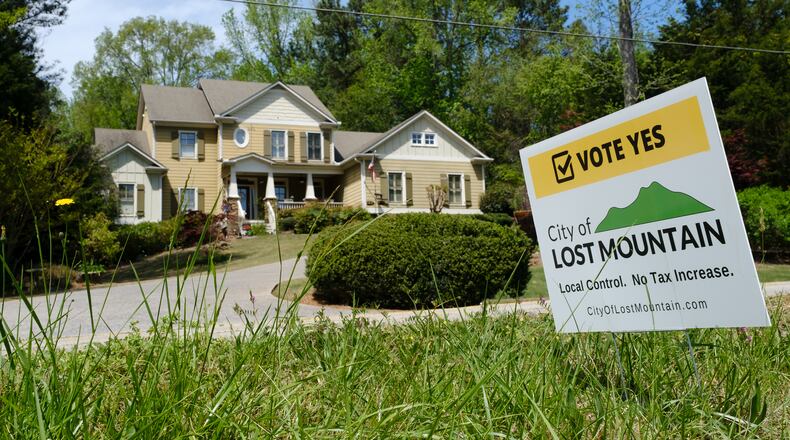Much of Cobb County will remain unincorporated after voters overwhelmingly rejected efforts by Republican state lawmakers to create three new cities.
Covering many of the northwest Atlanta suburbs’ most affluent communities, the proposed cities of Lost Mountain, East Cobb and Vinings were billed by supporters as the only way to preserve their spacious suburban neighborhoods in the face of a rapidly developing — and increasingly diverse — Cobb County.
But resoundingly, voters elected instead to preserve something else: Their independence from a city government.
In unofficial results Wednesday morning, East Cobb was defeated in a landslide with 73% of voters opposed, three years after a similar effort was withdrawn over a lack of community support.
West Cobb voters defeated the Lost Mountain cityhood effort 58% to 42%, while Vinings, a community of just 7,000 people, rejected cityhood by 255 votes, with 55% opposed.
From the outset, the movements evoked comparisons to cityhood efforts that have proliferated across metropolitan Atlanta over the last few decades.
Starting with Sandy Springs in 2005, a number of communities that are wealthier, whiter and more conservative than their surrounding areas have formed their own cities in a rebuke of their Democratic-led county governments.
In Cobb, after decades of conservative control, Republicans began suffering losses in state and national races in 2016, before losing control of the county commission in 2020.
David Shock, a Kennesaw State University political science professor who studies local government, said the Cobb cityhood movements may have failed where others succeeded because the campaign was based on abstract fears of Democratic control, rather than any tangible gripes about the county government.
“Sandy Springs had a multi-decade list of grievances with (Fulton) County,” Shock said. In Cobb, “most residents have been happy with county government and county services for decades.”
Some critics believe the cityhood campaigns’ tactics may have played a role in their defeat.
After Republican state lawmakers moved up the elections from November to May, cityhood supporters frequently promoted misinformation in town halls and campaign mailers, casting Democratic Chairwoman Lisa Cupid as a threat to suburbia, and claiming without evidence that high density apartments and crime were coming for their neighborhoods.
“Use your hatred (for Democrats) and vote along these lines,” is how Bob Lax, an East Cobb Republican who opposed cityhood, described the pro-city campaign.
Dora Locklear, the leader of West Cobb Advocate, which campaigned against Lost Mountain cityhood, recalled speaking with an elderly woman the day before the vote.
“She said: ‘I just realized that we have been lied to, and I’m so mad,’ ” Locklear said. “...I really think that there is a portion of people who voted no because they were not happy with how it was done.”
In a statement provided to the AJC, East Cobb cityhood leaders doubled down on criticisms of cityhood opponents and county leaders, who they said tried to prevent a vote from happening at all. Cityhood opponents unsuccessfully sued to have the referendums struck from the ballot, while county officials had asked that the vote be held in November to give staff more time to prepare for the election and study the impact to public services.
“Although the county and opposition didn’t want citizens to vote, the community had their voices heard,” the statement said. “Make no mistake; the facts have not changed. East Cobb will be under increasing growth and tax pressure from Cobb County to urbanize our community. ... Cobb’s policy direction explains why the county worked so hard to stop the cityhood effort(s).”
State Rep. Ginny Ehrhart (R-Powder Springs), a leader of the Lost Mountain cityhood movement, and Vinings cityhood leader Taryn Bowman did not respond to messages seeking comment by the AJC’s publication deadline.
In an interview, Cupid said the election’s outcome “speaks for itself.” But, she added, the movements may provide lessons for county leaders on how to address unmet needs of residents, such as waste collection.
“One thing that’s more immediate that we have been mulling for sometime is transforming our policies around waste,” she said. “It wasn’t until the cityhood movements, though, that it revealed that citizens were willing to go to the extent of creating a municipal waste service” in some parts of the county.
A fourth cityhood movement, that of Mableton in South Cobb, will be on the ballot in November. But the political dynamics are different. A less affluent, majority-Black area, Mableton earned near-unanimous support from the state Legislature unlike the three others, which were approved largely along party lines.
About the Author
Keep Reading
The Latest
Featured




